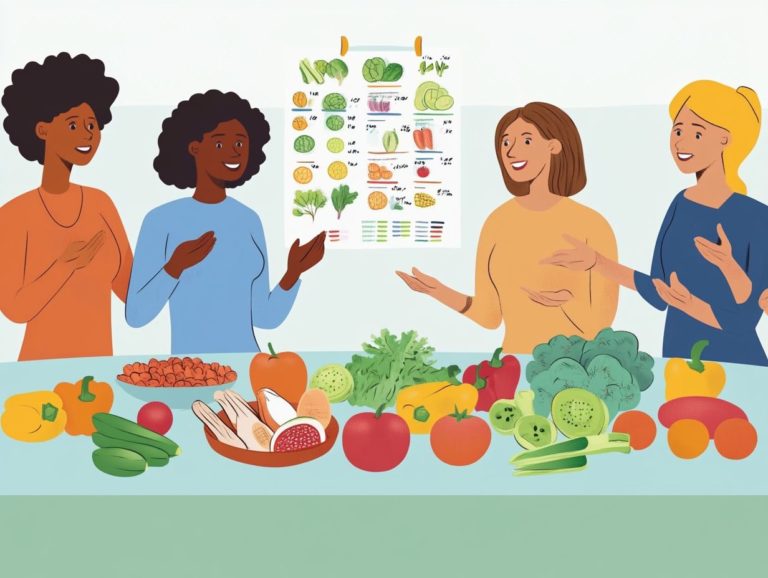How to Transition to a Plant-Based Diet?
Curious about the benefits of a plant-based diet? You re in good company! This lifestyle choice is gaining traction for its impressive health advantages and positive environmental effects.
This article delves into what a plant-based diet truly entails and the multitude of benefits it brings. You ll discover a step-by-step guide to facilitate your transition, along with tips for navigating common challenges and enticing meal planning ideas to keep your motivation soaring.
Start your journey now for a healthier, more sustainable lifestyle!
Contents
- Key Takeaways:
- Understanding a Plant-Based Diet
- The Benefits of a Plant-Based Diet
- How to Transition to a Plant-Based Diet
- Challenges and Tips for Success
- Meal Planning and Recipes for a Plant-Based Diet
- Creating Balanced and Nutritious Meals
- Making the Transition Sustainable
- Incorporating Small Changes and Staying Motivated
- Frequently Asked Questions
Key Takeaways:
- Transitioning to a plant-based diet means incorporating more whole, plant-based foods and reducing or eliminating animal products.
- A plant-based diet can improve your health and reduce your environmental impact.
- To successfully transition to a plant-based diet, start by making small changes, meal planning, and finding motivation to stay consistent.

Understanding a Plant-Based Diet
Understanding a plant-based diet is crucial for anyone aiming to enhance their health and lower the risk of chronic diseases like heart disease and diabetes.
This dietary approach encourages you to embrace unprocessed foods, featuring whole grains, fruits, vegetables, legumes, beans, healthy fats, and plant-based protein sources, while significantly reducing or eliminating animal products.
The Mediterranean diet exemplifies this lifestyle beautifully, showcasing a diverse array of food groups that promote overall well-being and champion sustainable eating practices.
What is a Plant-Based Diet?
A plant-based diet primarily revolves around foods derived from plants think fruits, vegetables, whole grains, legumes, nuts, and seeds while keeping animal products to a minimum.
This approach encourages you to indulge in wholesome, unprocessed foods and highlights the importance of nutritional value in your daily meals. By prioritizing these plant-based components, you can significantly enhance your nutrient intake, gaining vital vitamins, minerals, and antioxidants.
Experts frequently recommend such dietary adjustments as a pathway to better health outcomes, including enhanced heart health and effective weight management.
Focusing on whole foods helps you develop better eating habits, fostering a greater awareness of food quality and its profound impact on your overall well-being.
The Benefits of a Plant-Based Diet
The advantages of adopting a plant-based diet are abundant, offering everything from enhanced health to greater environmental sustainability.
This makes it an appealing option for anyone looking to improve their health.
Health Benefits
The health benefits of adopting a plant-based diet are impressive. You can enjoy a lower risk of heart disease, better weight management, and increased fiber intake that aids digestion and promotes overall well-being.
Research suggests that by following a plant-based regimen, you can significantly reduce your risk of chronic illnesses like type 2 diabetes and certain cancers. A study published in the Journal of the American College of Cardiology found that individuals consuming a diet rich in fruits, vegetables, whole grains, and legumes can lower their heart disease risk by as much as 40%.
By incorporating a diverse array of plant-based foods into your meals, you enhance your micronutrient intake, gaining essential vitamins and minerals often lacking in animal-based diets. This improved nutritional value bolsters your immune system and supports healthy aging, making this dietary choice a powerful ally for your long-term well-being.
Are you ready to discover how a plant-based diet can transform your health? Join the movement today and make a change for your health and the planet!
Environmental Impact

The environmental impact of a plant-based diet is significant. It encourages sustainable eating practices that help reduce greenhouse gas emissions and conserve precious natural resources.
By embracing foods derived from plants, you’ll dramatically lower your carbon footprint since meat and dairy production demands extensive land, water, and energy resources.
Transitioning to a plant-based diet opens up a world of diverse food options, including:
- Fruits
- Vegetables
- Legumes
- Whole grains
Each plays a role in reducing pollution and waste. Growing these crops typically results in less chemical runoff and contributes to a healthier ecosystem.
By making these mindful choices, you not only enhance your personal health but also participate in the responsibility to preserve the environment for future generations.
How to Transition to a Plant-Based Diet
Transitioning to a plant-based diet can be an enriching journey. It involves thoughtful dietary changes, effective meal prep strategies, and the exciting inclusion of plant-based alternatives in your daily meals.
This journey boosts your nutrition. It also improves your cooking skills.
Step-by-Step Guide
A step-by-step guide to transitioning to a plant-based diet begins with understanding the necessary dietary changes and implementing effective meal planning strategies that focus on plant-based meals and a variety of food items.
Break this journey down into manageable phases to adjust gradually. Start by exploring nutrient-dense foods like legumes, whole grains, fruits, and vegetables simple swaps that can easily replace animal products.
Meal planning is highly effective, so dedicate time each week to craft menus filled with exciting recipes that highlight seasonal produce.
Embrace different cooking techniques, from steaming and roasting to creating comforting dishes, to uncover new flavors and textures.
By gradually introducing these changes, you can enjoy the richness of a plant-based lifestyle while savoring delightful meals that inspire creativity in your kitchen.
Challenges and Tips for Success
You might face some challenges when adopting a plant-based diet, such as navigating social situations, ensuring your nutritional needs are met, and overcoming common obstacles. However, with the right strategies and a positive mindset, achieving success is entirely within your reach.
Overcoming Common Obstacles
Overcoming obstacles when transitioning to a plant-based diet often involves strategic meal prep and discovering plant-based alternatives that fit seamlessly into your social life.
For many, the initial hurdle is the perceived complexity of crafting meals that are both nutritious and satisfying. It can feel daunting to overhaul your eating habits, especially around friends or family who may not share the same dietary preferences.
Employ meal prep techniques like batch cooking and portioning meals in advance to smooth this transition. Explore plant-based substitutes for your favorite foods, such as swapping cauliflower rice for conventional grains or choosing almond milk over dairy, to integrate these changes easily into your daily routine.
With thoughtful planning and the right alternatives, this lifestyle switch can become not just manageable but genuinely enjoyable.
Meal Planning and Recipes for a Plant-Based Diet

Effective meal planning and innovative recipe ideas play a vital role in sustaining a plant-based diet. By carefully curating your meals, you can ensure they are not only nutritionally balanced but also a delight to the palate, allowing you to savor delicious vegan recipes every step of the way.
Start your plant-based journey today!
Creating Balanced and Nutritious Meals
Creating balanced meals on a plant-based diet means enjoying a variety of food groups. Think whole grains, legumes, fresh herbs, and healthy fats.
This approach guarantees you ll load up on essential vitamins and minerals while supporting your overall health and well-being.
For instance, the combination of quinoa and black beans provides a complete protein source. Toss in a mix of vibrant vegetables, and you ll boost your meal’s fiber and antioxidant content significantly.
Fresh herbs like cilantro or basil can elevate your dishes without adding extra calories. A drizzle of olive oil introduces healthy fats that are great for your heart.
By incorporating these diverse elements into your daily meals, you open the door to creativity in the kitchen. Experiment with flavors and textures until you discover that perfect balance.
Making the Transition Sustainable
To make the shift to a plant-based diet easy, start with small changes. This way, you can adapt without feeling overwhelmed.
Discover methods that inspire and motivate you, ensuring a lasting commitment to sustainable eating and, ultimately, a healthier lifestyle.
Incorporating Small Changes and Staying Motivated
Small changes make a big difference. Instead of overhauling your meal plan, swap specific items for plant-based options gradually.
If pasta is a staple for you, try replacing conventional noodles with zucchini spirals or whole-grain options just once a week.
The importance of motivational support cannot be overstated. Joining local or online communities where individuals share their success stories, recipes, and tips can help you stay committed.
One person shared her experience with meatless Mondays. This not only introduced her family to exciting new flavors but also ignited engaging conversations around their meals, fostering a sense of camaraderie that truly made a difference.
Frequently Asked Questions
Curious About Plant-Based Diets?

A plant-based diet consists mainly of foods derived from plants, such as fruits, vegetables, whole grains, nuts, seeds, and legumes. This type of diet typically excludes or minimizes the consumption of animal products.
Why Transition to a Plant-Based Diet?
There are many potential health benefits to transitioning to a plant-based diet. It can reduce your risk of heart disease, diabetes, and certain types of cancer. A plant-based diet is also better for the environment and can be more budget-friendly.
How to Start Transitioning?
Start transitioning by gradually replacing meat and dairy products with plant-based alternatives. Incorporate more plant-based meals into your diet while reducing your consumption of animal products.
What Challenges May I Face?
Some common challenges include finding suitable plant-based alternatives to favorite foods, learning to cook with new ingredients, and dealing with social situations that may not offer plant-based options.
Great Sources of Protein on a Plant-Based Diet
Great sources of protein include beans, lentils, tofu, tempeh, nuts, seeds, and whole grains. These foods not only provide protein but also contain other important nutrients.
Ensuring Nutrient Intake
It’s crucial to have a varied diet to ensure you get all the necessary nutrients. Include a variety of fruits, vegetables, whole grains, and plant-based protein sources in your meals. Consulting with a registered dietitian for personalized advice is also a great idea.
Ready to dive into a healthier lifestyle? Start your journey today!




